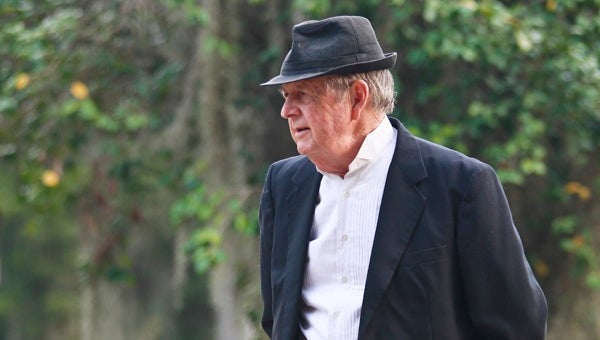Fitts to be inducted into Black Belt HOF
Published 10:31 pm Tuesday, January 27, 2015

Selma’s “unofficial historian” Alston Fitts III will be inducted Friday into the Black Belt Hall of Fame at the University of West Alabama in Livingston. He is shown above during October’s Haunted History Tour at Old Live Oak Cemetery.
Selma’s “unofficial historian” Dr. Alston Fitts III will be inducted Friday into the Black Belt Hall of Fame.
The ceremony and luncheon will be held Friday, Jan. 30 at noon at the University of West Alabama’s Bell Conference Center.
“I didn’t expect this honor,” Fitts said. “And it’s been an incredible honor to be ranked with [other inductees]. I do not feel worthy compared with them.”
Along with Fitts, the late Judge Rufus C. Huffman Sr. and the late Richard L Thurn will be inducted.
The Black Belt Hall of Fame recognizes and honors those from the Black Belt who have had a positive impact on the region, state, nation and the world through contributions in art, business, education, industry, medicine, politics and science.
Upon hearing he was going to be inducted, Fitts said he felt flustered, but thankful.
“I was startled, disconcerted and touched of course,” Fitts said. “Some folks in town worked hard to bring me to the attention to the hall of fame. I’m touched that people cared enough to do that.”
When asked about his love of the Black Belt and why he has dedicated so much of his time to the history of the region, Fitts questioned how could he not have done that.
“It’s where I live and where I work. If I lived somewhere else in some other section of the country I would do what I could for that [city],” Fitts said.
“But I was southern born and bread. … And how could I not do what I can for the people I know and the place that I live?”
Throughout his life, Fitts has worked to bring the city’s black and white history together as well as encourage interactions between the races in the Black Belt. His career as an amateur historian began when he started researching Benjamin Sterling Turner and the Old Live Oak Cemetery.
Fitts also wrote the book “Selma, Queen City of the Black Belt” that was commissioned by the Selma City Council to be a modern history of the city.
He was also an instrumental part of the renaming of East End Elementary School to Sophia P. Kingston, who was an early leader in African-American education.
“I was very please and proud when the East End School was renamed and took the name of its original founder Sophia P. Kingston,” Fitts said.





